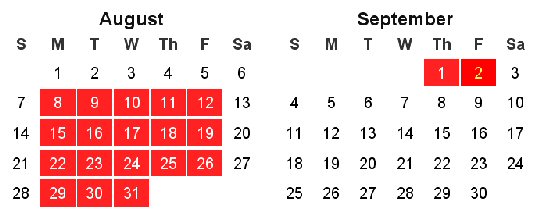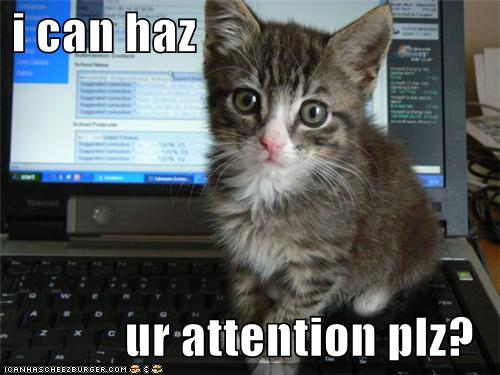Getting Things Done: Screw Perfection, Nix Distractions, and Don’t Break the Chain
In this article, I will describe different strategies for getting things done. Some are things that I’m doing myself, and some are observations that I’ve made about the success of other people. If you apply these strategies to your own life, you will cause your great ideas to manifest into actual results.
1. Screw Perfection
Sometimes you think that if you’re going to do anything at all, you want to “do it right.” You imagine what’s necessary to do the task perfectly, but some detail prevents you from doing it that way. Instead of doing something less than perfect, you do nothing at all.
For me, the pursuit of perfection has always been the largest hurdle in reaching my writing goals. I will start to work on something, but within minutes of starting I convince myself that it’s not good enough. This initial doubt causes me to give up on the idea completely. Striving for perfection is a huge hindrance, because I actually prefer to publish nothing at all than publish anything that I think is “bad.”
The result is a detrimental cycle where nothing is getting done. If you do nothing for one day, it’s simpler to do nothing the next day. Then after you’ve done nothing for two days, it’s easier to do nothing for three, and so on. Anyone who’s ever had a gym membership knows what I’m talking about: If you get out of the habit of going, it’s easy to quit going completely.
Screw perfection. If you aim for it, you will fail.
Furthermore, when you’re afraid of failure, perfection will cause a paralyzing fear that lets you accomplish nothing at all. You’re afraid of making a wrong choice, so you don’t choose anything. You’re left spinning your wheels, and time passes you by.
That’s not how success works! You can’t expect your first business to be a success without making any mistakes. You can’t expect the first book you write to be a best seller. You can’t expect the first song you record to be a smash hit.
Jonathan Coulton, an American singer and songwriter, realized this when he started his Thing A Week series in 2005. His goal was to write and record one song a week for an entire year. For the duration of the project, he recorded songs and uploaded them to his website weekly for fans to listen to, even if he didn’t think the songs were that great.
Since they were created within such a short deadline, his songs were hardly perfect (in fact, most of “JoCo’s” song lyrics are truly absurd). Even so, he successfully recorded 52 songs in a year, and one song “Code Monkey” was popularized online. This pillar song was written on week 29 of JoCo’s Thing A Week project, and its popularity attracted listeners to his other work.
The subsequent popularity of Coulton’s digital albums and his Thing A Week projects propelled him into a successful music career fueled by geek culture. He has opened live at They Might Be Giants concerts, and at Mystery Science Theater 3000 events. Coulton now makes $500,000 a year from his music despite lacking a record label contact.
The thing is, if Coulton had waited until his songs were perfect before sharing them, he might have never shared them at all. He never would have developed such a strong fanbase on his website and gotten to where he is today if he hadn’t pushed the envelope for his creativity. I find his methods for producing songs and his resulting success to be fascinating, because it’s almost as though he told himself: “Screw perfection, I’m gonna write some music.”
2. Nix Distractions
The Internet is a funny animal. It somehow manages to be the best writing assistant imaginable, as well as my most distracting arch-nemesis. Although I can use the Internet to look up word definitions, to read online articles that help inspire new writing ideas, and to broadcast my thoughts to a global audience, it is also filled with countless distractions — mostly pictures of cats.
A lot of the Internet is pointless, but it’s pointlessly amusing. One minute you’re searching for something relevant, which in turn leads you to something curious, which then leads you somewhere else entirely. I once found myself lost on the net, somehow watching a Japanese fitness video where women were working out while chanting things like “We were mugged by two men.” When I finally realized what I was doing I wondered How did I even get here?
The best way to deal with distractions? Eliminate them.
I don’t mean that you should delete your Facebook account, toss your laptop, and nuke your ISP in order to escape the Internet. I simply mean that whatever your distraction of choice is (cable TV, video games, cell phone, the Internet), find a way to distance yourself from it. Turn your TV off. Work somewhere you can focus. If you can’t concentrate at home, leave your place and go do your work at the library or nearby coffee shop. Turn your phone off.
When I go to my local library, I enjoy working in a designated “quiet area.” Cell phones are prohibited, and talking is reduced to a whisper. Everyone around me is buried in their work, and such an environment causes me to want to work too. I practically feel like I need to be working hard in order to fit in. Browsing pictures or videos on the net while the guy next to you is studying for the MCAT really drives home the fact that YOU SHOULD BE WORKING.
3. Don’t Break the Chain
Reaching your goals takes time. Even if you are able to overcome perfection and avoid distractions, your long-term goals will be slow-going. With this in mind, if you truly want to achieve something, it is best to work towards it on a daily basis.
This is tough. Life is often unpredictable, and you’re bound to be spending your time on the tasks that are in the forefront of your mind. Furthermore, you’ll likely be worn out from the demands of daily life, and the long-term goals that you want to achieve may be put off for future “to-do” lists.
Jerry Seinfeld uses a productivity secret called “Don’t Break the Chain.” His method for writing every day is to get a yearly calendar, hang it on the wall, and draw a huge X across every day that he writes something.
Over time, he creates a “chain” of Xs on his calendar. Seeing his progress visually encourages him to keep writing, so that he won’t “break the chain.” Furthermore, after 30 days of doing something consistently, it becomes a habit. At this point, it seems unnatural to miss a day in the chain.
I’m trying this now. On Mondays, Wednesdays and Fridays I’ve been writing articles to publish on my blog. On Tuesdays and Thursdays I’ve been adding to my fiction story so that I’ll eventually have about 80 pages of a manuscript. My intentions are that my blog will earn more money the more I write in it, and my fiction story will grow large enough to submit for consideration at the University of Iowa’s creative writing program. So far, my calendar’s “chain” looks something like this:

Even though I’m not yet writing on the weekends, I’ve found that the process of writing often is coming more naturally to me. While I previously used to go months without posting new content to my blog, and gave up on my fiction stories completely, I’m now noticing that I’m anxious to write more. I’m determined to mark off another day that I spent working towards my goals.
There are countless strategies available for getting things done. These are some of the best ones that work for me. I’d be interested to hear about any other strategies you’ve discovered that work well for you!



 Alex Moschina is a creative professional based in South Florida. He’s also a good friend and former co-worker of mine that may or may not owe me some money.
Alex Moschina is a creative professional based in South Florida. He’s also a good friend and former co-worker of mine that may or may not owe me some money.




